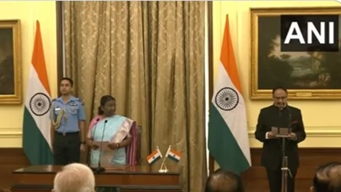Central Information Commission
Why in the news?
- Heeralal Samariya, the Information Commissioner, has been appointed as the Chief Information Commissioner.
- The oath of office was administered by President Droupadi Murmu at Rashtrapati Bhavan.
- Samariya previously held the position of Information Commissioner within the Central Information Commission.
- Information Commissioners Anandi Ramalingam and Vinod Kumar Tiwari also took the oath of office in a separate ceremony organized by the Central Information Commission.
Central Information Commission
- Establishment: The Central Information Commission (CIC) was established on October 12, 2005, under the provisions of the Right to Information Act, 2005.
- It serves as an independent and final appellate authority to ensure transparency, accountability, and access to information within the government.
- Jurisdiction: The CIC’s jurisdiction extends over all Central Public Authorities, which includes various government bodies, departments, and ministries.
- Role: It plays a crucial role in upholding the right to information for Indian citizens, allowing them to access government records and documents.
- Members: The CIC consists of a Chief Information Commissioner and several( currently 6)Information Commissioners.
- Appointment: The President appoints the Chief Information Commissioner based on recommendations from a committee that comprises the Prime Minister, Leader of the Opposition in the Lok Sabha, and a Union Cabinet Minister nominated by the Indian Prime Minister.
- Tenure: The Chief Information Commissioner and an Information Commissioner will serve their terms as determined by the Central Government or until they reach the age of 65 years, whichever comes first.
- They are not eligible for reappointment.
- The commission hears appeals and complaints related to the denial of information by public authorities and ensures that government officials comply with the RTI Act.
- Can Initiate an investigation into any matter based solely on valid and justified grounds (suo-moto authority).
- Its decisions have significant implications for government transparency, making it an essential institution for democratic governance and accountability.





